
Here is the most peculiar part of the Ascension story: At the end of his Gospel account of the Ascension, Luke tells us that afterwards the apostles “returned to Jerusalem with great joy, and were continually in the temple praising and blessing God.” Luke 24:52-53
That’s the last thing we would have expected. I mean, Jesus their Lord and Master was gone. In the three short years they had known Him, they had come to love Him so dearly. They had seen Him do wonders of so many sorts, had stood in awe as He healed the sick, restored sight to the blind, walked on water, multiplied fish and bread, even told them on which side of the boat to catch fish.They had heard what can only be called His “phenomenal” teachings: His deep understanding of the mysteries of life and death and what lies beyond, and also of the practical matters of how to live a truly good and happy life. They had loved walking through the hills and towns of Galilee with Him – sharing their lives with Him, eating and drinking with Him, just being with Him. To their horror they had seen Him crucified and then to their wonder alive, fully alive again. They surely hoped it would go on forever.
But now so suddenly it was all over. Those days will not be replayed. Jesus is gone. You’d think they’d have returned to Jerusalem, acting as if they’d been to a funeral – mournful, downcast, filled with grief. Why ever were they filled with joy? praising and blessing God?
Here. I’ll give you the answers before we begin. It was because:
1 Though He had left, He was still here.
2 He had given them work to do for Him.
3 He had promised they would one day be with Him where He is.
4 They knew that He who had left but was still here, would someday return.
That requires some explanation. Let’s do a little Bible Study about the Ascension, which may help explain.
The Ascension of Our Lord and God and Savior Jesus Christ
Texts: Mark 16:19-20 Luke 24: 50-53, Acts 1:9-11
Oddly, the Gospel accounts of Matthew and John say nothing about the Ascension. Obviously they were aware He had gone “somewhere”, because His bodily appearances had ceased. Why did they say no more? “It’s a mystery.”
Mark mentions the Ascension, albeit briefly: “So then, after the Lord had spoken to them, He was received up into heaven, and sat down at the right hand of God.” Mark 16: 19 From Mark came the words we recite every Sunday in the Creed: “He ascended into Heaven and is seated at the right hand of the Father.”
Only Saint Luke tells the story of the Ascension – twice, in fact, once at the end of his Gospel account, then again at the beginning of his Book of the Acts of the Apostles.
Luke’s tells us where the Ascension took place: “He led them out as far as Bethany *, and He lifted up His hands and blessed them. Now it came to pass, while He blessed them, that He was parted from them and carried up into heaven.” Acts adds details: “while they watched, He was taken up, and a cloud received Him out of their sight. And while they looked steadfastly toward heaven as He went up…”
- The village of Mary, Martha and Lazarus, only two miles east of Jerusalem.Were they present at His Ascension? Orthodox icons reflect the tradition that the Lord’s Mother was there. Orthodox hymns tell us that He actually ascended from the Mount of Olives, just west of Bethany.
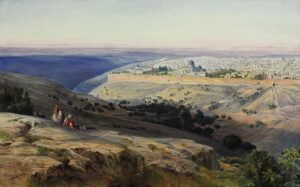
In Acts, Luke’s second book, we are told that the Ascension took place forty days *after the Resurrection. Both books tell us that during this period He taught them “things pertaining to the Kingdom of God”. Luke’s Gospel specifically mentions that He helped them to understand all the prophecies about himself in the Scriptures. Beginning on Pentecost, this was the core of the earliest preaching: Christ died and rose, all “according to [in accordance with] the Scriptures”. (Read Acts, chapter two.)
- “Forty” appears many times in the Scriptures. It seems to mean a “sufficient amount of time”, explaining why Christ chose to ascend after forty days.
So He went up to Heaven, simple as that. Or is it? How literally should we take that word “up”? Western Christian painting usually portrays Christ being majestically lifted up into the sky.
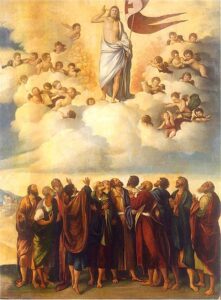
\
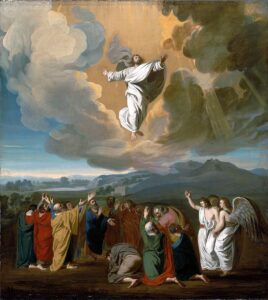
Our Orthodox iconography is more circumspect, showing Him symbolically raised up enclosed in a “mandorla”, which (I looked it up) “signifies an event which transcends time and space”. Yes! Precisely.
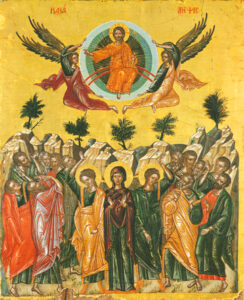
It’s clear from the accounts that He did go up. However, surely He did this for symbolic purposes * – to indicate that He was returning to the “higher” world, Heaven, Nobody ever thought He was going forever up like a balloon or something. Acts makes this clear: …”He was taken up before their very eyes, and a cloud hid Him from their sight.” Acts 1:9
- We often use the word “up” in a “non-literal” way: A businessman moves “up in the world”. A child moves “up” from third grade to fourth grade.
What happened here was not a spatial change, but a “super-spatial” change, a departure to a higher “plane of existence”, the highest Plane of Existence, Heaven, which lies “beyond”, “above”, “outside” our world, so to speak. There are no human words adequate to describe or locate it.
The disciples already knew the risen Lord was not confined by our time and space. For forty days He had been arriving and departing bodily “though the doors were shut”, and so on. At the Ascension, He departed upwards to make it clear that He was now leaving, that His bodily appearances on earth would now cease.
Now, let’s get to the reasons why the disciples were filled with joy when He “left”:
1 When Christ left, He didn’t actually leave.
In some of His last words to His disciples He promised: “Behold, I am with you to the end of the age.” Matthew 28:20 And then He left!
The best “practical” way to describe His Incarnation is to say, as we do in the Creed, that “He came down from Heaven”. Nor are we talking in spatial terms, here. In some of our mind-bending hymns * we sing that “Christ came to earth without leaving Heaven” or sometimes “while remaining in the bosom of the Father” (that is, remaining inseparable with His Father) or that “He returned to Heaven without leaving the earth”.
- But now that I want to find an example, I can’t. In case you don’t know, there are literally thousands of hymns appointed for Orthodox worship, most used chiefly in monasteries.
While He walked this earth, our Lord Jesus was still continually present in Heaven with His Father. Now that He has ascended into the Highest Realm, there is never the slightest distance between Christ and us. Not for a moment. It’s not possible.
Why not?
In the first place, because He is “Christ our God”. God is necessarily everywhere. There is nowhere God is not: “…where can I flee from Your presence? If I ascend into heaven, You are there; If I make my bed in hell, behold, You are there. If I take the wings of the morning, and dwell in the uttermost parts of the sea, Even there Your hand shall lead me, and Your right hand shall hold me.” Psalm 139:7-10 And if Christ is God, then those verses apply to Him.
Saint Paul referred to this (though in a puzzling way) when he wrote that during the Exodus the Hebrews “drank of a spiritual rock that followed them, and the rock was Christ.” 1 Corinthians 10:4
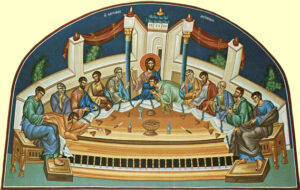
Also, the disciples knew that Christ had left His bodily presence with them. They had been there when He did it: “This is my Body, given for you. Do this to re-call * me.” Just as our bodies are where we are present, so the Body of Christ is where He is present still among us.
- The usual English translation, “Do this in remembrance of me” is misleading and inaccurate, and I wish we would junk it. The Greek word “anamnesis / ἀνάμνησις” does not translate precisely, but it means something closer to “re-call” in its original literal sense. Do this to “call me again”.
Furthermore, Christ remains present with us bodily in the Church, in the “people of God”, our brothers and sisters in the Faith. I think this first came to be understood because of Saint Paul’s conversion experience. He had been persecuting the Church, but the Lord Jesus said to Him, “Saul, Saul, why are you persecuting Me?” Someone wrote that when Orthodox think of “Body of Christ’, they often think first of the Church, the community, and then of the Holy Eucharist.
That’s the first reason the apostles were filled with joy. As they traveled out into the world proclaiming the Gospel of Jesus Christ, they knew He was always with them, “the Lord working with them”, as Mark put it, both in life and in death.
2 They had work to do!
Immediately before His Ascension they (still not “getting it”) asked if He would now restore the Kingdom of Israel. “He said to them: ‘It is not for you to know the times or dates the Father has set by his own authority. But you will receive power when the Holy Spirit comes on you; and you will be my witnesses in Jerusalem, and in all Judea and Samaria, and to the ends of the earth.” They had no time to mope. Only ten days later they would began their great mission which would consume the rest of their lives.
3 They knew they would someday be with Him.
He had told them: “I go and prepare a place for you … I will come again and receive you to Myself; that where I am, there you may be also.” John 14:3 As may we all, if we are faithful to Him.
This was almost unbelievably good news to His disciples who believed, as most Jews did, that when they died, they would go to Sheol, the place of the dead, where they would gradually fade into non-existence. (The contemporary belief that when we die we all automatically go to Heaven exists because of the teaching of Jesus about the afterlife – or to be more precise, because of exactly one half of the teaching of Jesus about the afterlife.)
Even more, as Saint John would later write (a line which Orthodox quote often): “Beloved, now we are the sons of God, and it is not yet made manifest what we shall be; but we know that if He shall appear, we shall be like him; for we shall see Him as He is.” 1 John 3:2 Like Jesus Christ, risen bodily from the grave, who ascended bodily into Heaven. That is why the Gospel reading for the feast of the Ascension begins with the Upper Room and Pascha night: “Touch and see. I am no spirit”. And He ate and drank before them.
Heaven is not a place for spirits, for ghosts. That’s Sheol, that’s Hades, that’s the underworld. That’s not Heaven. In Heaven there is room for the fullness of human nature, soul mind and body. The evidence for that? Because our resurrected Lord ascended, taking His entire human nature with Him, soul, mind, and body, into Heaven. When we die, our souls and bodies are separated for a time, as was true with Christ for three days. And so with us, the fullness of Heaven will be a Real Place – not less than here but MORE THAN HERE, where the good things of earth will not be left behind, but will come to fulfillment. That was the third reason the disciples were filled with joy.
4 Christ will return.
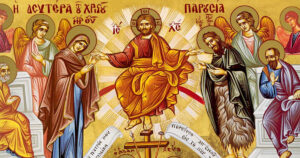
The angels who stood by them said: “Men of Galilee, why do you stand looking up into Heaven? In same way you have seen Him go into Heaven, in the same way He will return.” We say it at every Divine Liturgy: “He will come again in glory to judge the living and the dead.”
Christ had taught about this often enough. (See Matthew chapter 24 and 25, for example.) And at His Ascension: “… while they looked steadfastly toward heaven as He went up, behold, two men stood by them in white apparel, who also said, ‘Men of Galilee, why do you stand gazing up into heaven? This same Jesus, who was taken up from you into heaven, will so come in like manner as you saw Him go into heaven.’” Acts 1:10-11
This Lord Jesus of ours, who “came down from Heaven and was incarnate of the Holy Spirit and the Virgin Mary” – even though He had always been omnipresent everywhere, and has never left us – will return, this time in glorious majesty, to set things right in this world and unite Heaven and earth, making this earth into Heaven.
When will this happen? We don’t know. Christ said even He didn’t know. Matthew 24:36 But He promised. Therefore “Amen, come, Lord Jesus.” Revelation 22:20
“With the Lord one day is as a thousand years, and a thousand years as one day. The Lord is not slow concerning His promise, as some count slowness * but is longsuffering toward us, not willing that any should perish but that all should come to repentance.” 2 Peter 3:8-10
- Years ago, I hoped our Lord would come soon. Now I’m glad He didn’t. If He had returned twenty five years ago, our grandchildren would never have existed. If He had come a hundred years ago, I would never have existed. None of the people I know and love would ever have exited. So far as I’m concerned, He can take His time.
Summary
When Christ ascended, His disciples knew that was not the end of the story. It was only the end of the beginning – the brilliant introductory chapter to the story which will go on and on and on and … … … …
“And they worshiped Him, and returned to Jerusalem with great joy, and were continually in the temple praising and blessing God. Amen.” Luke 24: 50-53
Next Week: Pentecost I’m going to try to find the origin of and explanation for those e x t r e m e l y l o n g Kneeling Prayers.
Week after Next: Saints